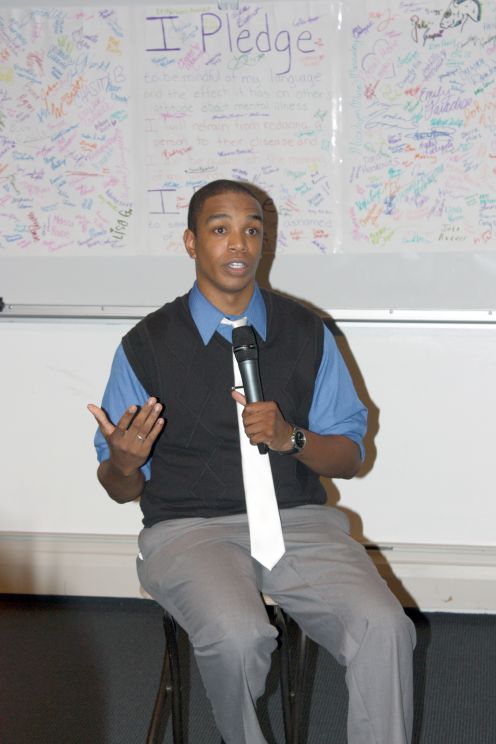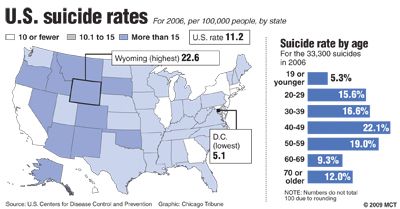
Young adults often have to deal with pressure from all sides: family, friends, school and work. Stress may even occur from their most favored free-time activities. Because of the often demanding nature of others, and the added pressure of life changes at this crucial moment in their lives, many students find themselves faced with a depressed day here, a depressed day there. But, sometimes, those days turn into weeks – and a serious condition develops.
“There’s a difference between depression and just feeling depressed,” Jordan Burnham, 22, said to a packed Widener Lecture Hall on Tuesday, Oct. 11 on behalf of Cabrini’s Active Minds chapter and the Counseling and Psychological Services department. According to Burnham, depression is a frustrating, sudden onslaught of negative thoughts, often with self-harm in mind. “Everyone gets those feelings of depression. They’re normal. But, when someone’s actually depressed, the difference is that they can’t even figure out what caused their depression.”
Burnham was diagnosed with depression at the age of 16. A star athlete of his suburban high school at that time, he admitted to originally being skeptical about the diagnosis. “I figured depression’s a cold. I told myself, ‘It’ll go away in a couple of weeks.’”
As Burnham proved throughout the evening, however, it was not that simple. What seemed to him like an unimportant diagnosis ultimately led to his attempted suicide.
It all started before his move to the area, when he made the transition from public to private school. “At private school, I was accepted for who I was,” Burnham said. But public school didn’t provide that security. “In public school, I was made fun of for talking ‘too proper’ and dressing ‘too preppy.’ I was told that I acted ‘too white.’”
Around that time, Burnham said, his sister received a full academic scholarship to Penn State and moved to college. His father’s career was also under transition – an interview was scheduled for a new job in King of Prussia. Burnham was given a tough decision. “I remember asking myself, ‘Do I stay with my mom in Pittsburgh until she gets a job in the Philly area, or do I move to Upper Merion with my dad?’”
Burnham knew that the transition would be difficult. On top of it, his sister’s absence meant that his “depressing, lonely thoughts” concerning school had to be kept to himself. “I didn’t know that I could go to a counselor without a serious problem to be discussed,” Burnham said.
His freshman year in high school was the first time that he ever tried to please others just to fit in. “I drank because that was the one time that a guy was allowed to feel without feeling judged; I would drink to express my thoughts and emotions.”
Diagnosed with depression as a sophomore, Burnham remembered his feelings during that crucial period. “I said to myself, ‘There is no reason for me to go see a therapist. How could some older white lady therapist understand a 16-year-old black male?’” He admitted to feeling cautious about the therapy sessions, and said that, for anyone seeking help, it often takes several therapists before they find someone they feel entirely comfortable opening up to.
He also recounted the pressure of having a sister that was the valedictorian of her graduating class in high school. “I would tell myself, ‘If I’m not as good as my sister, I’m not of value to this family.’” Burnham struggled through his junior year of high school. Halfway through, he also cheated on his then-girlfriend. Because of this and previous events, he started questioning what life would be like if he wasn’t there.
A little while later, his parents checked him into a mental hospital. “I always expected a guy in a straitjacket, screaming something crazy, like, ‘Flavor Flayv!’” Burnham said, the audience responding with laughter.
“It wasn’t as bad as I thought,” Burnham continued, “but everyone else was going through worse issues than me.” He felt both mentally and emotionally safeguarded in the hospital. It was an awakening experience for him. “There were things that I could tell strangers in a mental hospital, but I couldn’t tell those same things to people that I’d been best friends with for years.”
After having been released from the hospital, however, Burnham’s life took a turn for the worse. While his parents were away, he threw a party and the police were called. He was caught drinking underage. “No one in my immediate family drank,” Burnham said. Shortly after the incident, his dad found a duffel bag of alcohol in the trunk of his car.
Burnham recalled that being the night of his suicide attempt. “At the time, the part of me that was going through depression, that’s what part of me that I wanted to die.”
He jumped from the ninth-story window of his apartment in an attempt to end his life. Burnham had an estimated 40 percent chance at surviving the fall. He considers it a miracle that he did. Among the many bones of his body that broke from the fall were his left fibula, tibia and pelvis, in addition to severe internal bleeding.
“It was an impulsive act,” Burnham said. “I didn’t write a note, I didn’t leave a letter. Even on the car ride home that night I didn’t know it would be the night that I would try to kill myself.”
When he came-to in the hospital, he was told that he had been completely sober and alone during the attempt.
“I remember the second I entered high school, I couldn’t wait to be the big man on campus,” Burnham said. “Yeah, I went to prom, but in a wheelchair. Yeah, I was able to get my diploma, but I walked up to receive it with a walker.” This past Sept. 28 was the four-year anniversary of his suicide attempt.
According to Burnham, 7 out of 10 individuals who abuse alcohol or drugs in college have a serious mental health problem.
Although he hasn’t fully recovered and admits to still suffering from depression, Burnham has since become an international public speaker on the topics of mental health issues and suicide prevention for Active Minds. His work has garnered him a number of prestigious awards and significant media attention, including features in Sports Illustrated, USA Today and People Magazine. He has also made appearances on Dr. Phil, CNN, Good Morning America and The Early Show.
“At the end of tonight,” Burnham concluded, “I don’t want you all to just focus on my story. I want you to think over the entire mental health spectrum.”



